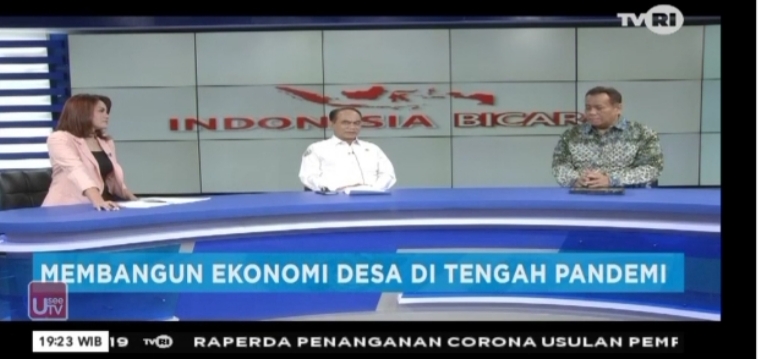UI Rector Ari Kuncoro on TVRI: Developing Village Economy amid Pandemic
Nino Eka Putra ~ FEB UI Public Relations Officer
DEPOK – (23/9/2020) The Covid-19 pandemic has greatly affected the national economy, particularly village economy. In fact, villages are Indonesia’s key economic potential. There are 74,953 villages the government and other sectors can rely on to drive the economy faster amid the pandemic.
Universitas Indonesia’s Rector Professor Ari Kuncoro, in a discussion entitled “Developing Village Economy amid the Pandemic” in the Indonesia Bicara (Indonesia Talks) program on TVRI on Wednesday (23/9/2020), hosted by Nurul Jamilah, said that economic recovery during the pandemic occurs in secondary cities like Klaten and Karanganyar. This means that those cities are supported by villages through symbiotic relationship that forms a hierarchy.

Therefore, villages must increase their attractiveness, including by offering attractive holiday packages and using videos to promote the packages through YouTube and other social media to encourage people to visit the villages and increase spending there.
“A developed village is characterized by the number of ATMs availble there, which indicates financial inclusion. This means the villagers are financially included and can obtain loans and run businesses. This calls for adequate infrastructure. Villages have village-owned enterprises (badan usaha milik desa, Bumdes) that have the potential to integrate activities run by the central government as all government units exist in villages. This allows for different types of activities. Village/regency governments should collect data on the activities and businesses run in other villages,” said Ari.
Ari added that to improve village economy, young villagers should be employed and receive education and training to make them fit for their jobs, such as making short films as done by the so-called Nepal Village to promote local products and exotic lodgings and uploading them on YouTube or other social media platforms. In addition, all villages should be geared toward digitalization and provided with information technology infrastructure (internet connection, laptop/computer, smartphone, etc.)
There should be a guarantee for a decent life in the form of employment (agriculture, fishery, mining, etc.) and micro business to convince young villagers to remain in their village and promote village products. Ari suggested that the Ministry of Villages, Development of Disadvantaged Regions and Transmigration play an active role in realizing and supporting village potentials to encourage young villagers to tap into the local natural resources..
“Today, Indonesia’s economy is quite balanced, with 59% of economic activities taking place in cities. This means that the ratio of population to land in villages is improving. Therefore, agriculture should remain the focus of village economic transformation but with more derivative activities. Meanwhile, there should be a sustainable program that links remote villages with other villages,” said Ari. (hjtp)
(lem)




